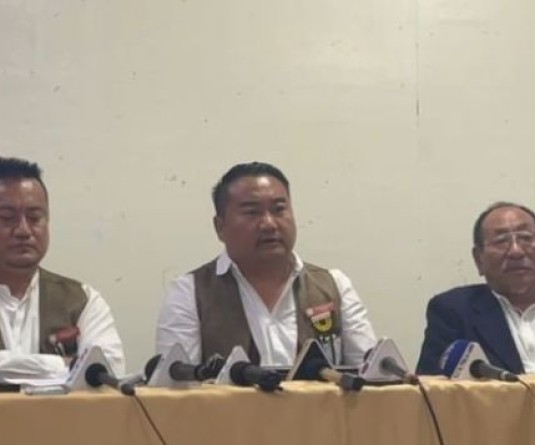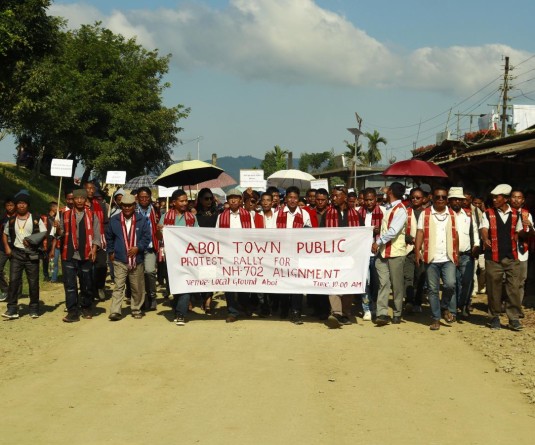A security force personnel is seen patrolling along the National Highway between Dimapur and Kohima. The Government of India announced the extension of the Disturbed Areas Act in the entire state of Nagaland for six more months from June 30 onwards. (Morung file Photo)
Naga Hoho says there is no space for such draconian law in this democratic country
Kohima, July 5 (MExN): The Government of India’s decision to extend the Armed forces (Special Powers) Act (AFSPA), 1958 in the entire state of Nagaland for six more months has drawn flak from various organisations since it was announced on June 30.
On July 5, the Naga Hoho expressed anguish over the Government of India’s decision despite repeated appeals by several Naga civil society organisations and human rights activists to repeal the ‘draconian law.’
“There is no space for such draconian laws in any civilized society in this largest democratic country. The Nagas struggle for self-determination cannot be equated with ‘terrorism’ or ‘secessionism’ as the Government of India has recognized the uniqueness of Naga political history and further recognizes the universal principle that in a democracy, sovereignty lies with the people,” it said in a press release issued through its Media Cell.
Expressing anguish over the ‘callous attitude’ of the Government of India (GoI) towards the repeated appeals to repeal the law, the Naga Hoho lamented that successive governments, irrespective of various political parties in Delhi, have remained mute spectators ever since the enactment of the draconian laws.
Citing the ongoing political negotiation and peace process between the Government of India and the Naga people, the Naga Hoho stated that there is a peaceful atmosphere in Naga areas as of now and that any policy that harms the atmosphere of trust and confidence would prove detrimental.
It also said that both the GoI and the Naga people agreed to a settlement that would respect the wishes of the people, sharing the sovereign power and to establish a new relationship for an enduring and lasting relationship between two, while asserting that “The AFSPA must be summarily repealed from our land.”
Removal of AFSPA is a necessary precursor to just resolution: GNF
In a separate statement, the Global Naga Forum (GNF) said that the removal of AFSPA is a necessary precursor to a peaceful, honourable, and just resolution of the Indo-Naga political issue.
The Forum said that the latest extension was a matter of grave concern to the Naga people, and termed the AFSPA as “an affront to modern civilized nations and the rule of law.”
The Act, it said, is not only anti-democratic but overrides the legal recourse of the people of Nagaland for human rights violations by the Indian Army, investing military personnel and the state Governor with extra-judicial powers. “In other words, AFSPA is the modern Indian version of the most extreme repressive tool of government from the colonial era. It is a shameful stain on postcolonial India’s body politic. AFSPA must therefore be immediately and permanently repealed from Naga Homelands,” it asserted.
Stating that the Government of India is in an on-going peace negotiation with different Naga Political Groups, the forum opined that the Act was extended “For reasons only known to Indian government decision makers,” and extra-judicial powers have been given to the Governor of Nagaland who is also Interlocutor of the Indo-Naga Peace negotiation.
The Forum stated that the armed conflicts in the Northeast started with the Indian Army’s operations in the Naga Hills in the 1950s, and not because of “insurgency” by Nagas. The conflicts, it said, increased after India’s imposition of AFSPA which “created a militarized ‘state of exception’ for the region for over a half century, outside of the rule of law in India.”
AFSPA is so egregious to human rights and to democracy that conscientious international scholars have called it India’s untenable “AFSPA regime,” it added.
“Would a settlement concluded between India and Nagas while AFSPA is in force, as it is now, not be seen as having been made under some degree of duress?” it asked.
GNF referred to the Chief Minister of Nagaland’s written response to the Governor’s concerns about law and order in the state in June 2020, where the former stated that: “Overall law and order situation in the state continues to be normal and peaceful. All the wings of the law and order machinery of the state are working effectively in tandem to ensure a peaceful atmosphere.” The CM also wrote that, “The state government is of the view that the assessment of the law and order being precarious and grim and having deteriorated and collapsed since August 2019 does not appear to be factual.”
“It stands to reason to ask, then, why continue imposing AFSPA in Nagaland? What is the Governor’s agenda in this? And why wouldn’t the State government not oppose the extension of such a draconian law on the people whose democratic and civil rights the government is sworn to protect?,” it posed.
“We believe immediate and permanent removal of AFSPA is a necessary precursor to a peaceful, honourable, and just resolution of the Indo-Naga political problem. The Global Naga Forum fervently hopes both sides in the Indo-Naga peace negotiation will engage each other in good faith,” it added.





